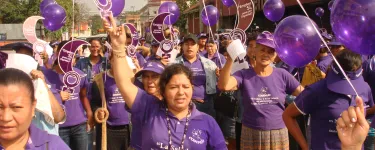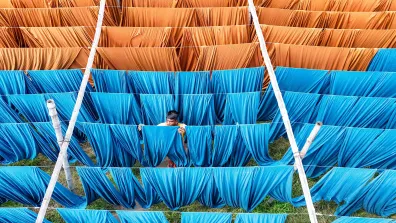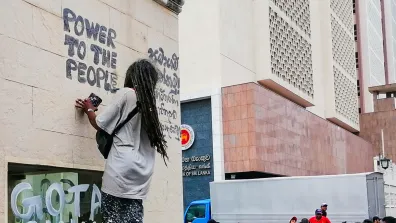Women factory workers in Honduras

Honduras is the third largest exporter of clothes and textiles to the US market, employing approximately 110,000 workers, 53% of whom are young women from deprived backgrounds with little education. Many of the clothing factories are found in Honduras' 24 Export Processing Zones (EPZs), industrial areas with low or non-existent taxes and a cheap labour force designed to attract foreign investment. The determination of multinational corporations to cut production costs and maximise profits and the lack of enforcement of labour laws by the Honduran government have led to the widespread exploitation of workers.
Workers in textile factories, or maquilas as they are known across Central America, face sweatshop conditions and there is a systematic failure to protect worker's health. Forced overtime and long hours undertaking repetitive movements to meet unrealistically high production targets as well as unsafe working conditions and minimal periods of rest have left many maquila workers with permanent injury. Factory owners and manufacturing companies deny these workers medical care and refuse to pay out compensation for their negligence, leaving workers disabled and destitute for life. Occupational disease threatens the livelihoods of workers and their families, affecting their ability to continue working and earning a living in a country where an estimated 65% of the population live below the poverty line.
Women workers are also vulnerable to other rights abuses such as the denial of maternity leave, forced pregnancy tests and sexual harassment or violence. A compulsory requirement for women before taking a job is to undergo a medical assessment, in which particular attention is paid to whether a woman is pregnant. In these cases the women will be rejected. On top of all this, women textile workers are paid a paltry salary for their long hours and high risk work. Though the textile industry has brought jobs to the country the reality is that maquila workers in Honduras continue to live in poverty with wages averaging £30 a week.
Honduran labour laws fail to address the health and safety risks posed by textile factories and do not recognise occupational diseases stemming from the manufacturing industry. There are only a handful of labour inspectors to oversee the conditions of hundreds of factories across the country and they often find themselves refused access to the factories preventing them from carrying out their work.
Maquila workers are unaware of their right to work in an environment that does not damage their health and they lack the skills and legal support to negotiate effectively with employers and decision makers. They are actively discouraged by their bosses from joining or forming trade unions and the names of those who do are then shared with other factories, making it extremely difficult for these individuals to find new jobs.
Codemuh (the Honduran Women's Collective in Spanish), is a feminist, women-led grassroots organisation that has been fighting for women worker's rights and their empowerment for over 20 years. Codemuh is run by women seeking change in society that allows them to fully realise their potential, free from exclusion and discrimination. It has adopted an innovative and grass roots approach, developing strong networks of women maquila workers. These women are equipped, through training, with the skills and self esteem to become labour rights promoters reaching out to workers on factory floors and in their local communities. Codemuh also provides legal and medical advice to workers suffering occupational disease and empowers them to speak out and challenge the abuse of labour rights by factory owners and the complicity of the government.
Codemuh is the only organisation in Honduras to tackle occupational health in the textile industry and is focusing its efforts on overhauling health and safety labour legislation which has remained unchanged since 1959 when the manufacturing industry was not developed. After carrying out extensive research and gathering legal and medical evidence, Codemuh successfully submitted a proposed reform of the legislation to the Honduran National Congress in March 2008. Codemuh was waiting to hear the response of the Supreme Court of Justice when the June 2009 coup halted the process. Codemuh was forced to turn its attention to the most pressing challenges posed by the coup and to play a leading role in the National Front of Resistance to bring democracy back to Honduras.
For the International Aid Transparency Initiative (IATI) data and documents for this DFID funding see here.
Aims
- To organise and build the collective voice of women so they can challenge the abuse of rights in the workplace and at home
- To improve the lives of women workers by building their self-esteem, knowledge of their rights and skills to defend them.
- To conduct research and collect evidence to carry out awareness raising campaigns, negotiate with employers and decision makers and mobilise people to improve women’s lives.
- To push for reform and enforcement of labour laws so the rights and entitlements for women workers are improved.
- To enhance alliances with grassroots organisations, trade unions, and other networks for the improvement of women workers’ rights and women’s rights.
Successes
- Codemuh submitted a health and safety labour law reform to the Honduran National Congress in March 2008 with the support of 37 MPs. Codemuh was waiting to hear the response of the Supreme Court of Justice when the June 2009 coup halted the approval process.
- Codemuh has had two audiences at the Inter-American Court of Justice and in 2010 presented a report to the UN Special Rapporteur on the Right of Everyone to the Enjoyment of the Highest Attainable Standard of Physical and Mental Health.
- Over 60,000 workers have been reached through women's rights training, mass mobilisation and outreach programmes run by Codemuh.
- Since 2008, more than 30 cases of women workers suffering occupational disease, raised with the support of Codemuh, have been successfully recognised by the Government despite loopholes in the existing law.
- In 2010, Codemuh with the support of War on Want presented a collective case of labour rights abuses committed by US clothing manufacturer Hanes HBI to a people's tribunal in Madrid.
The facts
- From 1993 to 2007, the number of jobs in the maquila increased from 32,000 to 134,000. In 2009 the numbers of jobs fell to 110,000. 53% of these workers are women.
- 70% of the Honduran textile industry is controlled by foreign companies, with US companies alone owning 40%. Many leading clothing brands from Gap to Fruit of the Loom source their clothing from Honduras.
- Codemuh is supporting two collective cases of more than 100 women workers affected with occupational disease working for North American multinational corporations Gildan and Hanes HBI.
- Maquila workers earn roughly 3,900 lempiras a month (£125), far from sufficient to cover their basic living costs such as healthcare, food and education for their children, and well short of the 5,700 lempiras (£180) minimum monthly wage for workers in other sectors.
- Recent research carried out by Codemuh on occupational health and safety showed that 43% of women interviewed (1,436) suffered from occupational diseases.


